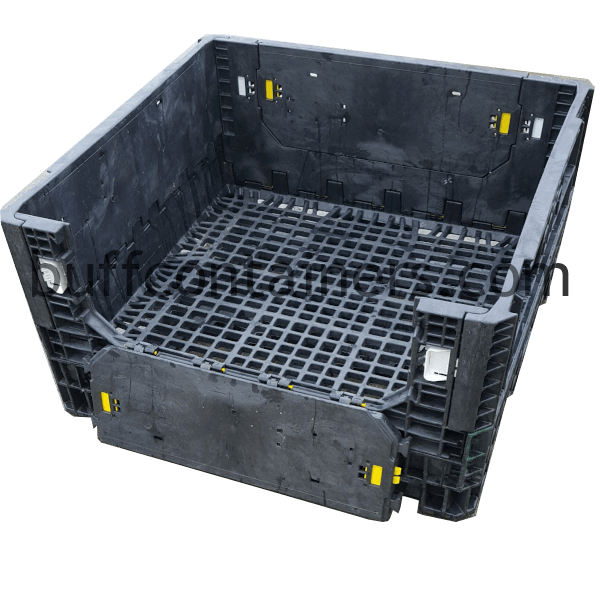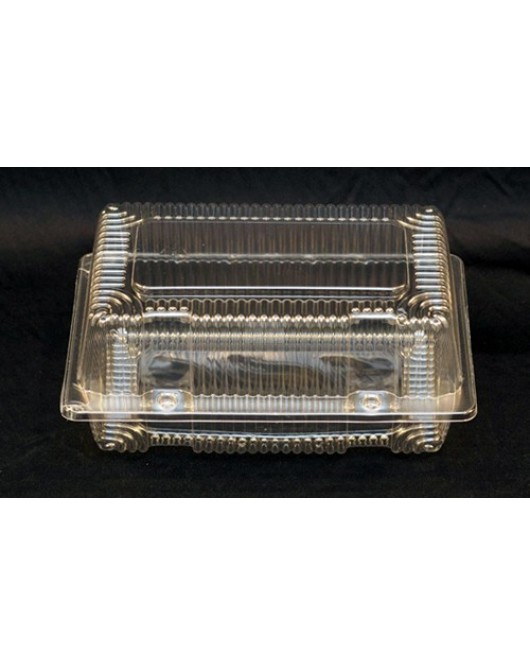Discover clever ways to organize goods with plastic bulk containers
A Comprehensive Guide to the Different Sorts Of Bulk Plastic Containers Available Today
Bulk plastic containers play a crucial role in numerous markets, offering remedies for storage and transport. Their varied types accommodate various requirements, from rigid options for solid materials to versatile containers suiting various shapes. Each kind presents distinctive benefits, making it vital to recognize their features and applications. As sectors advance, so do the needs for reliable container services. What elements should one consider when selecting the ideal mass container?
Introduction of Bulk Plastic Containers

Sorts Of Bulk Plastic Containers
Mass plastic containers been available in different types, each fit to certain applications. Stiff mass containers, adaptable bulk containers, and intermediate bulk containers represent the main groups, each offering special benefits. Recognizing these kinds is crucial for selecting the appropriate container for delivering and storing materials.

Stiff Mass Containers
Inflexible bulk containers are vital for reliable storage space and transport of various products throughout industries. These containers are usually constructed from durable plastics, permitting them to stand up to severe handling and environmental problems. They can be found in various sizes and shapes, consisting of totes, bins, and drums, making them ideal for keeping everything from granular materials to fluids. Inflexible containers usually include enhanced walls and safe and secure covers, making sure the materials continue to be protected throughout transportation. Their stackable layout takes full advantage of storage area, making them perfect for storehouses and producing centers. Furthermore, many inflexible bulk containers are recyclable and reusable, adding to sustainability initiatives. Generally, their effectiveness and adaptability make inflexible mass containers an important part in supply chain procedures.
Versatile Bulk Containers
Adaptable bulk containers, commonly referred to as flexible intermediate bulk containers (FIBCs), function as a flexible remedy for storing a variety and transporting of completely dry products. These containers are generally made from woven polypropylene and are created to be light-weight yet solid, permitting effective handling and piling. Their adaptability enables them to accommodate various forms and dimensions, making them suitable for products ranging from grains to chemicals. FIBCs can be geared up with features such as spouts for simple filling and discharge, in addition to protective coverings for boosted toughness. In addition, they are multiple-use and recyclable, contributing to lasting methods in industries like farming, food processing, and building and construction. Overall, flexible bulk containers offer a reliable and cost-effective choice for mass material management.
Intermediate Bulk Containers
Intermediate bulk containers (IBCs) are important for the reliable transportation and storage space of fluids and granular materials across various markets. These containers generally have an ability ranging from 275 to 330 gallons and are designed for easy managing and stacking. Made from sturdy materials like high-density polyethylene or steel, IBCs supply excellent protection versus contamination and environmental elements. Their layout consists of attributes such as a built-in pallet for forklift accessibility and a detachable top for easy dental filling and cleaning. IBCs are extensively used in chemical, food, and pharmaceutical fields, guaranteeing conformity with security policies. Their flexibility and reusability make them a cost-efficient service for bulk storage space and transport, adding to provide chain performance and sustainability.
Functions and Benefits of Bulk Plastic Containers
Bulk plastic containers are important tools in different markets, using a mix of longevity and functionality. These containers are created from top quality materials, making them immune to effects, chemicals, and environmental factors. This toughness guarantees item safety throughout storage space and transportation.
Additionally, bulk plastic containers are lightweight, assisting in convenience of taking care of and decreasing delivery prices. Their stackable style optimizes storage space efficiency, enabling maximized stockroom area. Lots of models include secure lids or closures, giving an impermeable seal that prevents and protects contents contamination.
In addition, mass plastic containers are recyclable and commonly multiple-use, adding to sustainable methods. Their flexibility permits for a wide variety of applications, from food storage to industrial usage, enhancing their worth throughout industries. Companies take advantage of the long lifespan and reduced upkeep needs of these containers, making them a cost-effective solution for both lasting and temporary needs.
Industries That Make Use Of Bulk Plastic Containers
Various markets profit from making use of mass plastic containers, each leveraging their one-of-a-kind homes for certain applications. The food and drink industry depends my blog on these containers for safe storage and transport of products, while the chemical manufacturing sector utilizes them for taking care of dangerous products. In addition, the pharmaceutical distribution needs stress the value of toughness and cleanliness in product packaging solutions.
Food and Beverage Market
As the need for effective and safe storage space solutions proceeds to climb, the food and drink sector progressively relies upon mass plastic containers for their operational demands. These containers give durable, light-weight, and flexible options for keeping active ingredients, finished items, and waste materials. Made from food-grade materials, they assure conformity with health and wellness standards. Various styles, such as stackable containers and lug boxes, optimize room during transport and storage, boosting logistical performance. Additionally, the openness of some mass containers enables simple supply management, lowering the danger of spoilage. With the sector's concentrate on sustainability, several makers are currently supplying recyclable and multiple-use choices, lining up with environmentally friendly methods while meeting the high demands of food security and health.
Chemical Production Industry
The chemical production market counts heavily on bulk plastic containers for the secure and efficient storage space of resources, intermediates, and ended up items. These containers are developed to withstand various chemicals, guaranteeing that harmful products do not leakage or deteriorate the container itself. Typical types consist of high-density polyethylene (HDPE) and polypropylene containers, which supply excellent chemical resistance and resilience. Their light-weight nature and stackable layout help with transport and storage, enhancing space in producing centers. Additionally, several bulk plastic containers feature features such as tamper-evident seals and easy-to-read labeling, improving safety and security and conformity with market regulations. Generally, bulk plastic containers are important to the chemical manufacturing process, offering trustworthy services for handling diverse substances.
Pharmaceutical Circulation Requirements
Drug circulation depends on mass plastic containers to satisfy rigorous security and governing requirements. These containers are vital for saving a selection and moving of pharmaceutical products, consisting of active pharmaceutical ingredients (APIs) and ended up drugs. Their layout warranties protection against contamination, light, and wetness, preserving the honesty of delicate products. Furthermore, mass plastic containers are compliant with sector requirements such as Great Manufacturing Practices (GMP) and are typically made from materials that are FDA-approved. The use of these containers enhances performance in the supply chain, allowing for secure, massive circulation while decreasing waste. Firms in the pharmaceutical field prioritize using sturdy, watertight, and tamper-evident containers to assure product safety and security and top quality throughout the logistics process.
Considerations for Selecting the Right Container
When picking the appropriate bulk plastic container, numerous variables need to be meticulously weighed to assure optimal functionality and security. The nature of the materials to be stored is paramount; compatibility with the container's material can affect stability and safety. Bulk Plastic Containers. Furthermore, the container's dimension and form should align with the storage space and transportation demands, ensuring reliable area use
Tons capacity is one more vital factor to consider, as it ought to suit the weight of materials without danger of damages or failing. The layout functions, such as airing vent or covers, can influence functionality and accessibility. Conformity with sector guidelines is necessary, specifically in sectors like pharmaceuticals, where safety and security standards are rigid.
Finally, the anticipated life expectancy and sturdiness of the container ought to be analyzed to confirm it meets the operational requirements without regular substitute. By reviewing these elements, one can select the most ideal mass plastic container for details applications.
Ecological Effect and Sustainability
As organizations significantly prioritize sustainability, the environmental effect of bulk plastic containers has actually come under examination. These containers, commonly made from products such as polyethylene or polypropylene, contribute considerably to plastic waste otherwise handled correctly. Their manufacturing entails the consumption of fossil gas, which can result in boosted greenhouse gas exhausts. Nonetheless, innovations in recycling technology and the development of biodegradable choices are aiding to mitigate these concerns.
Numerous suppliers are taking on techniques that highlight the usage of recycled products, consequently reducing the need for virgin plastics. The durability of mass plastic containers likewise plays a duty; they are developed to be reused several times, which can lessen their overall environmental footprint when contrasted to single-use choices. Eventually, the market encounters the obstacle of stabilizing capability with ecological responsibility, a knockout post making sustainable methods vital for the future of mass plastic containers.
Finest Practices for Storage Space and Transport
Effective storage and transportation of mass plastic containers considerably affect both operational performance and sustainability. To optimize space, companies need to pile containers firmly, ensuring security and stopping damage. Appropriate labeling is important for easy recognition, which improves access procedures. Additionally, preserving a orderly and tidy storage area lowers the risk of contamination and boosts safety and security.
For transportation, picking the appropriate automobile is crucial; containers should be protected to prevent moving throughout transit. Firms ought to also take into consideration using pallets to facilitate much easier loading and discharging. Routine examinations of containers for damage can avoid expensive substitutes.
Temperature level control is an additional essential facet, as extreme helpful resources conditions can jeopardize the stability of the plastic. Finally, training personnel on ideal practices for handling and transportation warranties compliance and promotes a culture of security. By applying these ideal practices, services can enhance their functional performance while adding to ecological sustainability.
Often Asked Inquiries
Just how Do I Tidy Mass Plastic Containers Successfully?
To clean mass plastic containers effectively, one should wash them with warm water, utilize a light detergent and scrub with a soft brush. Wash completely, then allow to air completely dry completely before storage space or reuse.
What Is the Life Expectancy of Mass Plastic Containers?
The life-span of mass plastic containers generally varies from 5 to 10 years, relying on the product, use, and environmental problems. Correct maintenance and storage can substantially prolong their use and resilience with time.
Can Bulk Plastic Containers Be Custom-made?

Do Bulk Plastic Containers Have Warranty Options?

Are There Laws for Using Bulk Plastic Containers?
Yes, guidelines exist for using mass plastic containers, mostly concentrated on security, environmental effect, and product conformity. These regulations ensure that containers satisfy industry requirements and appropriate for delivering different compounds safely and efficiently.
Inflexible mass containers, adaptable bulk containers, and intermediate mass containers represent the main categories, each offering one-of-a-kind benefits. Adaptable mass containers, often referred to as flexible intermediate mass containers (FIBCs), serve as a flexible service for carrying and keeping a variety of dry materials. The chemical manufacturing market relies greatly on mass plastic containers for the risk-free and effective storage of raw products, intermediates, and completed products. Bulk Plastic Containers. These containers are made to hold up against different chemicals, making sure that unsafe materials do not leak or deteriorate the container itself. Furthermore, mass plastic containers are certified with industry standards such as Excellent Manufacturing Practices (GMP) and are often made from products that are FDA-approved